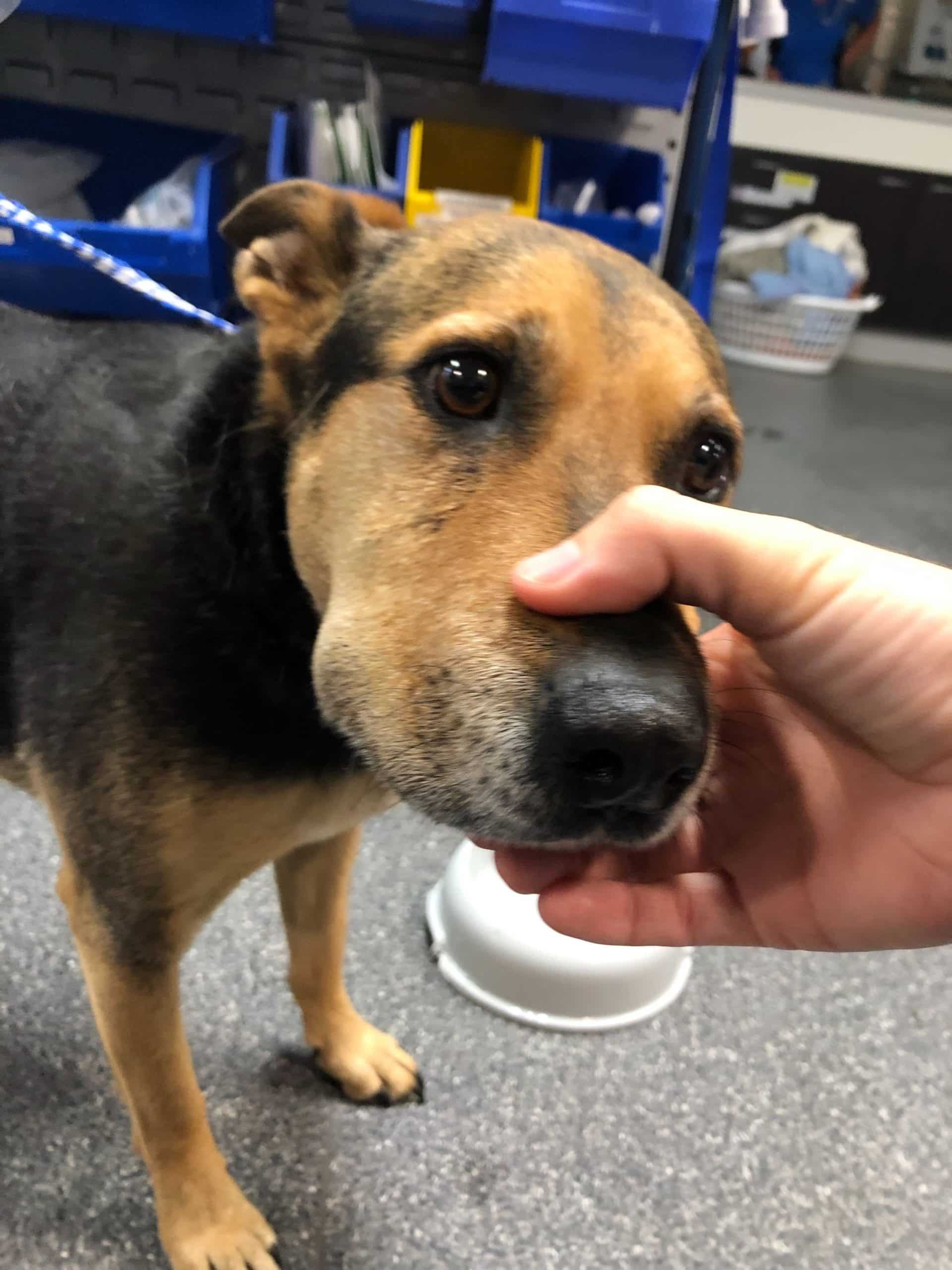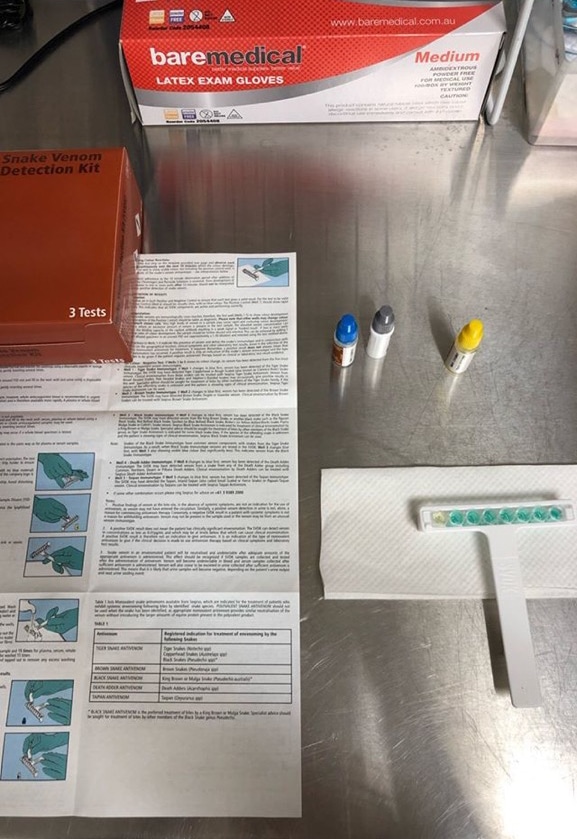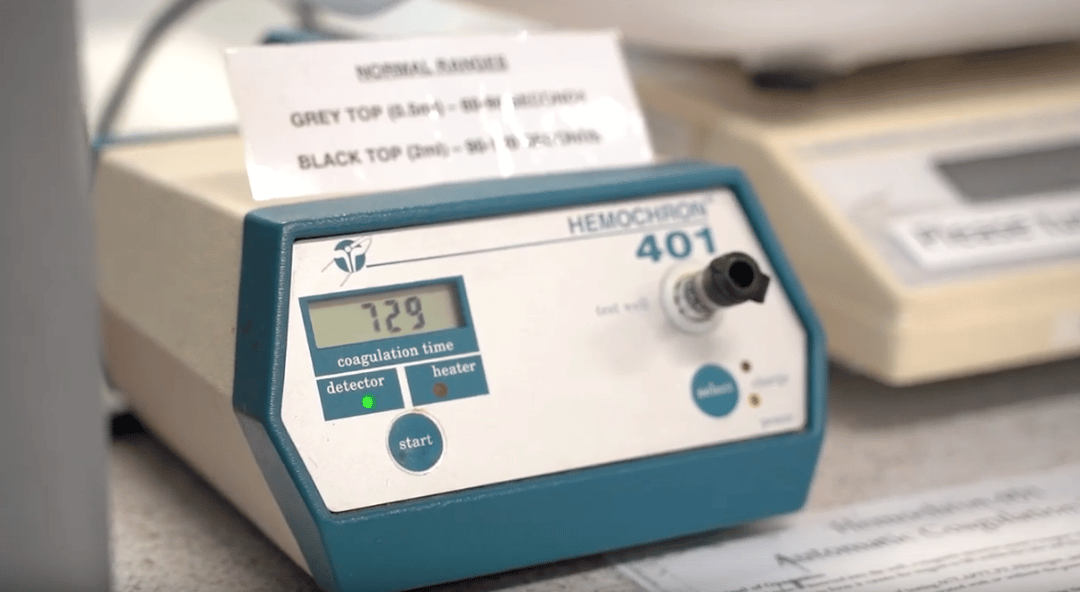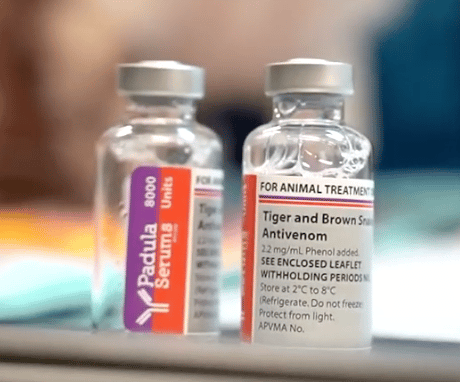This article contains the following information about the best treatment for snake bites on dogs:
- What information will my vet have about snakes?
- What can I expect when I get to the vet?
- How will the vet diagnose the snake bite on my dog?
- What is the best treatment for snake bites on dogs?
- Where can I find out more information about snake bites on dogs?
What information will my vet have about snakes?
Your vet will have information on the type of snake species, whether a bite is lethal or not, the clinical symptoms and signs unique to each snake and the snake’s distribution throughout Australia. Most importantly, they will be able to inform you regarding the type of anti-venom required.
What can I expect when I get to the vet?
Upon arrival, the emergency vet will undertake a thorough examination of your pets condition, which will include noting any signs or symptoms (read more here) that your dog is experiencing. It is extremely important to give the veterinarian as much information as you can – if you suspect your dog to have been bitten by a snake or seen your dog with a snake, near a snake, if the dog has a history of playing with/mouthing at/finding/hunting snakes. As well as if they have had any collapsing episodes followed by recovery.

How will the vet diagnose the snake bite on my dog?
- Initial blood test (ACT) done to assess whether your dog can clot its blood or not (key sign of snake envenomation)
- Urine samples and a snake venom detection kit to identify the type of anti-venom to use
After the thorough examination, the vet will use a snake detection kit to determine the presence of venom and immunotype (species) of snake that has bitten your dog. The most accurate sample to use is urine, however if this cannot be gathered, a blood sample or swab from the bite site can be used. The test detects ‘immunotypes’ – a property present in the venom of tiger snakes, brown snakes, black snakes, death adders and taipan snakes, informing your veterinarian of which vial of anti-venom to use and how much.

Another diagnostic test which is likely to be performed is an ACT (activated clotting time), as most venomous snake toxins possesses properties that cause the blood’s ability to clot. For more information about what an ACT test is and how it’s used, watch this video about Tic Tac, who was bitten by an Eastern brown snake.

Animal Emergency Service veterinarians follow a strict protocol on the diagnosis of snake bites on both dogs and cats, and use a number of diagnostics to determine snake envenomation. In addition, an Animal Emergency Service veterinarian will take note of your dog’s electrolyte levels, conduct a urinalysis (checking the appearance, concentration, and content of urine), and use other tests such as a red blood cell count to confirm the diagnosis of snake envenomation.
What is the best treatment for snake bites on dogs?
Your vet will use intravenous fluids to treat your dog for shock, and to support the animal’s blood pressure, ensuring the kidneys have adequate blood flow. If your pet has breathing difficulties, your vet will use oxygen therapy to ensure your dog can oxygenate adequately.
The best and most important treatment for snake bites on dogs is anti-venom. Your dog may need multiple vials of anti-venom to neutralise the venom present in the body as venom loads can reach up to 3600ug/ml in dogs and cats in comparison to the maximum human levels reaching only 200ug/ml. There are two major types of anti-venom products available on the market. Animal Emergency Service uses Padula Serums – which has been tested as highly effective in neutralising the venom from tiger snakes, brown snakes, and black snakes.

How does snake anti-venom work?
In layman’s terms, brown, black snake and tiger snake venom contains toxins that causes the blood to be unable to clot within minutes of envenomation as well as toxins which damage the muscles. These toxins also bind to the nerves that function the musculoskeletal system causing paralysis, including those of the respiratory system.
Padula Serum’s snake anti-venom is made from the formulation of purified horse serum, coming from horses that are hyper immunised to snake venom. The dose is administered into the dog’s blood stream, and once it takes effect, neutralises the effects of the unbound snake venom circulating in the bloodstream. This returns the blood coagulation properties back to normal, while time is required to allow the already bound toxins on the nerves to resolve.
Other treatments for snake bites on dogs
Anti-venom is vital for the survival of your dog, and the quicker the anti-venom is administered, the higher the chances of survival. However, there are other supportive therapies that may be used to treat the symptoms and signs of snake bites on dogs.
Mechanical ventilation is the act of assisting/controlling the dogs ability to breathe – life support. In severe cases of snake envenomation, mechanical ventilation may be used, however is not something entered into lightly by veterinarians as it can cause the body go undergo additional stress. Read more about mechanical ventilation here.
Where can I find more information about snake bites on dogs?
For everything you need to know about snake bites on dogs, visit: A guide to snake bites on dogs – symptoms, signs and treatment.
If your dog has been bitten by a snake or you suspect they have, contact your closest Animal Emergency Service hospital or your local vet immediately.
